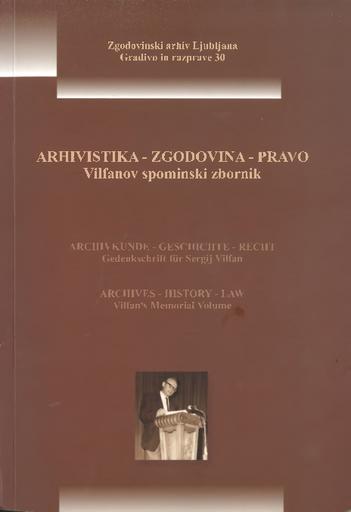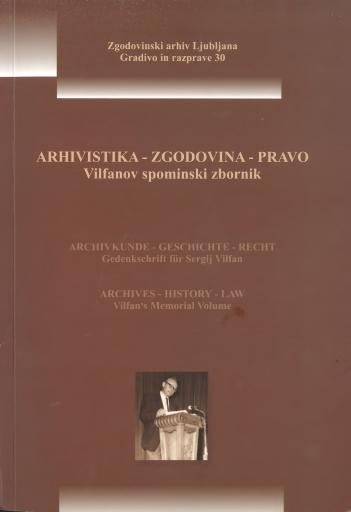/
Literatura
/
Monografije
»Zgodovinska pravotvornost« in odprte naloge slovenske pravne zgodovine

Avtor(ji):Marko Kambič
Soavtor(ji):Nataša Budna Kodrič (ur.), Tatjana Šenk (ur.), Magda Lojk (lekt.), Doris Debenjak (prev.), mag. Niko Hudelja (prev.), Katarina Kambič (prev.), Martin Cregeen (prev.), Tatjana Rodošek (foto.)
Leto:2007
Založnik(i):Zgodovinski arhiv Ljubljana, Ljubljana
Jezik(i):slovenščina, angleščina
Vrst(e) gradiva:besedilo
Zbirk(e):Gradivo in razprave : 30
Avtorske pravice:

To delo avtorja Marko Kambič je ponujeno pod Creative Commons Priznanje avtorstva-Nekomercialno-Brez predelav 4.0 Mednarodna
Datoteke (1)

Ime:arhivistika_zgodovina_pravo1.pdf
Velikost:26.99MB
Format:application/pdf
Stalna povezava:https://hdl.handle.net/11686/file25390
Opis
Zadnja knjiga akademika Sergija Vilfana z naslovom »Zgodovinska pravotvornost in Slovenci« je
izšla že po njegovi smrti. V njej je odprl vprašanje slovenske narodne oziroma ljudske
pravotvornosti, ki ga je v svojih prejšnjih temeljnih delih pustil bolj v ozadju. Delo se
torej ukvarja z vprašanjem nastajanja prava, ki ga označuje spontanost, anonimnost in
izvirnost »ljudskega« za razliko od nastajanja prava v organiziranih oblikah, značilnih za
moderne države in njihovo načrtno zakonodajo
Metapodatki (12)
- identifikatorhttps://hdl.handle.net/11686/41408
- naslov
- »Zgodovinska pravotvornost« in odprte naloge slovenske pravne zgodovine
- »Historical Formation of Law« and the Open Issues of Slovenian Legal History
- ustvarjalec
- Marko Kambič
- soavtor
- Nataša Budna Kodrič (ur.)
- Tatjana Šenk (ur.)
- Magda Lojk (lekt.)
- Doris Debenjak (prev.)
- mag. Niko Hudelja (prev.)
- Katarina Kambič (prev.)
- Martin Cregeen (prev.)
- Tatjana Rodošek (foto.)
- opis
- The last book of the academician Sergij Vilfan entitled »Historical Formation of Law and the Slovenes«, which was published only after his death, deals with the Formation of law among the Slovenian people, a subject that he left aside in his previous fundamental works. This study clearly shows that numerous phenomena that spread among the Slovenes were commonly used and typical for the Central European space, however they carried certain Slovenian characteristics because they were a part of the people's common legal consciousness for centuries. The acadeniician Vilfan believed that these particularities were not part of the »national spirit«, but the result of various historical circumstances. Although very cautious in reaching conclusions, he was nevertheless clearly and argumentatively breaking up a wellrooted conviction as regards a thousand years ofservitude and incapability of the Slovenian people to form their own law. He stated that independent legal development could also take place outside ofthe Roman-Germanic-Slavic scheme. On the basis of numerous examples the author demonstrated that the formation of law had a rieh tradition in Slovenian history. With his final book the academician Vilfan rounded up his work, created a certain synthesis, and presented a final conclusion to his vast research work. It may be said that his death and the publication of this book started a new era in Slovenian legal history, which will build upon Vilfan’s rich scientific legacy and valuable findings. The academician Vilfan was writing this book fully aware of the fact that his time was quickly running out. The book therefore presents a kind of his final testament as it explains the numerous issues that remain open and still need to be researched in order to make the picture of the Slovenian legal history more complete. The purpose ofthe presented article is to shed some light upon these tasks.
- založnik
- Zgodovinski arhiv Ljubljana
- zbirka
- Gradivo in razprave : 30
- datum
- 2007
- 01. 01. 2007
- tip
- besedilo
- jezik
- Slovenščina
- Angleščina
- jeDelOd
- pravice
- licenca: ccByNcNd
